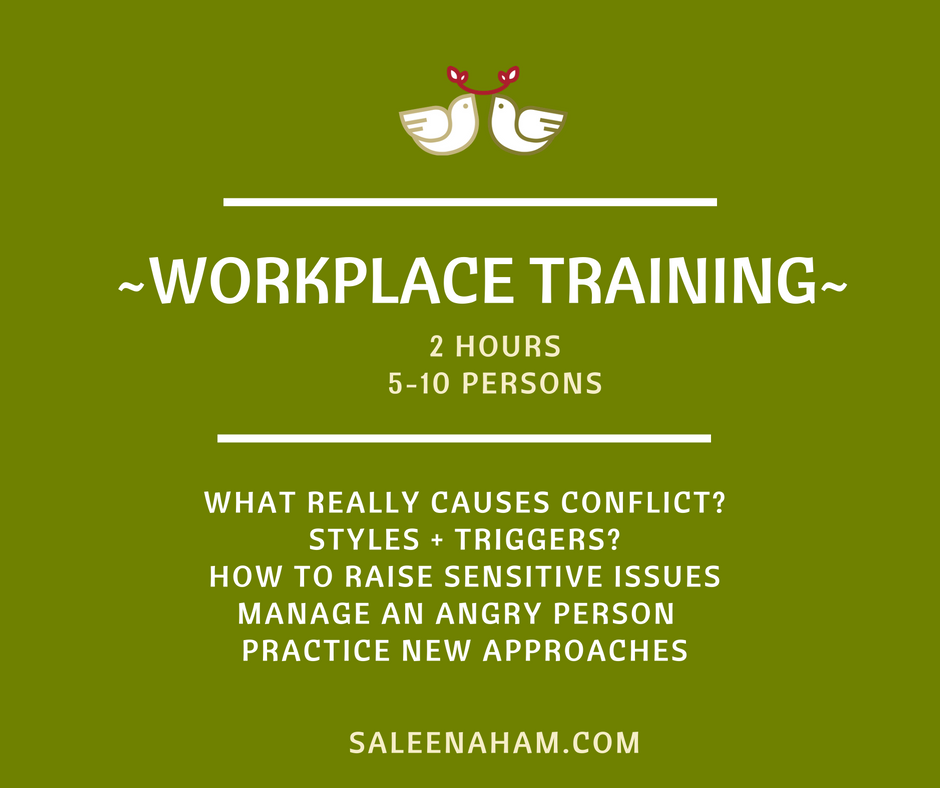Do your staff care about their work? Are they committed? Give their best? Help each other out? Are they using good communication skill to make life easy and enjoyable?
Do they come to work, do what they must do to get paid and then go home? Maybe they don’t speak well of their manager or their workplace or their colleagues. Or they aren’t as nice to clients.
Disengaged workers have less heart for what they are doing, low initiative and diligence. They are not as willing to solve problems and take creative risks.
And they are miserable. So more sick days, more turnover. Bad vibes. Big costs.
That’s an unmeasured loss. You don’t see the lost opportunities, the gains that are possible when your staff are willing, engaged, enjoying their work space, pace and challenge.
It’s a hidden cost.
Staff Disengagement Results From Rotten Relationships At Work
The main driver for staff disengagement is dysfunctional relationships. Bad communication between managers and their staff and between the staff themselves.
Rotten relationships. Toxic culture.
Poor communication. No recognition.
No trust. No safety to say what you see or what you think.
No respect for management. No confidence in their direction.
This is expressed as no or low mutual respect, no safety for personal expression, mis-aligned values and perceptions of questionable fairness in decisions. It’s modelled by management and it becomes a norm.
When people don’t feel safe at work, when they feel there is nothing in common with others or that their efforts are not valued or go nowhere, that there is inconsistency in recognition then disengagement in the workplace is an issue.
Poisonous relationships and unsafe work culture need to be addressed if you want to improve outcomes. If you work with humans – this really matters.
Engaged Staff Are Happy & Recognised
To improve the happiness and morale of your teams, take action to improve the communication skills of your managers. It starts with them.
Managers need to be able to give more effective direction.
Sounds obvious!
If there isn’t a clear and shared understanding about what are the primary goals and objectives then it is likely that some mixed messages will fly about.
This will depend on the communication of contextual factors that shift, on the original vision for the business and the reasons for that. Why are we here, actually?
Managers must require safe accountability from their staff.
If there are people who get away with sloppy hours, poor quality work, unexplained absence during the day and failure to prepare or deliver – then this must be addressed.
But often it is not.
Manage Conflict Early
Some Managers fear conflict. They fear hurting feelings and the consequences of bringing up bad news. Some find it hard to give frank feedback. This is not fair for the whole team and it erodes respect.
Managers can make gains with better information sharing because the more information relevant to the context, the more the sense of staff satisfaction.
People like to see outcomes tracked because they like to know why things are changing, shifting, uncertain.
Managers able to do this consistently get more buy in.
People can cope with uncertainty and even error but they can’t cope with silence and being kept in the dark – here is the place where fears and conspiracy theories grow.
Most people want to work well and they want to achieve results.
If you want to engage your people, look for company wide issues in how things are done, decisions are made, how people and projects are treated.
Look for particular problem spots and problem issues.
If there is conflict occurring between teams, or within teams then address it. Surface the issues and gaps – build solutions with respect for the diverse needs of the players.
Be willing to do things differently.
Model the behaviours you want. As a manager, the culture you set is the culture you’ll get. If you don’t give respect, don’t be surprised if you don’t get it.
Power of position is less and less effective than empowering your people. That takes particular skill. The rewards are significant.
Investing in building better communication and relationship skills for managers who struggle is a path to engaging staff and tapping into their massive capacities.
Are they horrible people, really?
Or are they just unskilled, unsupported and uncertain?
Not all managers can go from being expert staff promoted into leadership, without particular support.
Communication Skills Are Learned
When managers have explicitly better communication skills they engage more effectively with their teams and peers.
This doesn’t come naturally for everyone – it is learned. It’s cheaper to develop people than to replace them and the benefits ripple further.
Make the workplace a safe place for employees to raise ideas and observations, to be included, to think creatively.
When there is safety to express your opinions and ideas and willingness to give credit for creativity and initiative, it encourages staff to engage more.
Encourage staff to speak up. And listen when they do.
Give them insights, skills and confidence to ensure they know how to raise issues of accountability. And act on it.
Create opportunities for social engagement, celebration and reward – because this fights loneliness and disconnection.
People are not robots – they want recognition and growth. They want to be successful. They want their effort and ideas to matter.
That goes for managers and for staff. And for contractors and suppliers. And for customers and clients.
Better relationships make the workplace more enjoyable and it builds better results.
Invest in Building Good Communication
To improve the communication skills of individuals takes a bit more than giving direction to ‘communicate’ more. We have to know ourselves, our style and how we affect others.
We have to be willing to notice some things, to shift a few things, to experiment with new ways in how we behave.
We are all programmed and packaged by our life experience, personality preferences, patterns, triggers and level of maturity.
It’s difficult to know what we don’t know and it can be a little scary to start digging into that Pandora’s Box to address communication skills. But a little reflection is a good thing.
Personal development is an investment in productivity and performance so if you have disengaged staff, you are already making losses you can’t measure. (You don’t weigh the gains you never had.)
It should give them a clue about their own style and the implications of that for others.
It should provide them some skills in managing conflict, setting boundaries and raising sensitive issues such as non-performance.
Coaching, training and facilitation of team performance is an investment in more capable and engaged managers and staff. Coach them in delegating, reviewing projects for learning, experimenting on the job through action-learning initiatives and measuring results.
Engaged managers can connect with their staff and build rewarding workplace relationships. Those working friendships happen in safe and enjoyable workplaces where good communication and mutual respect is a norm.
This culture supports communication, collaboration, fosters problem-solving and willingness to do the extra thing that makes your clients croon. Foster social connection and celebration.
People matter so make sure they know it. When you invest in their engagement, it will return to you.









